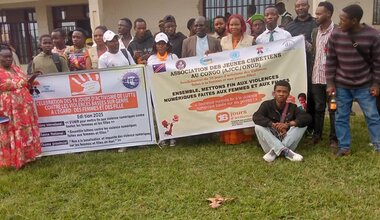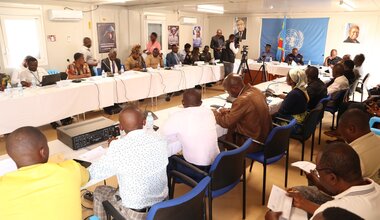Remarks by Kate Gilmore, Deputy High Commissioner for Human Rights, at the 33rd session of the Human Rights Council on the DR Congo
Geneva, 27 September 2016
Distinguished President,
Excellencies,
Colleagues and Friends,
For 20 years the Office of the High Commissioner for Human Rights has been a partner of the Congolese people and authorities. A long-standing commitment to the DRC.
Just this summer, the High Commissioner, at the invitation of the Government, was in the DRC to discuss a wide range of human rights concerns, including accountability for human rights violations, and reparation for victims; reinforcement of the legal framework and strengthening of the mechanisms for protecting civilians and human rights. The High Commissioner encouraged the authorities to embark on public confidence-building measures, so as to address legitimate grievances and tensions and create the basis for a credible national dialogue and electoral process.
Excellencies,
With strong commitment and close friendship comes responsibility – responsibility to speak out, to warn when danger looms ahead, to accompany each other even when there are differences of view or disagreements.
Last week's violent events in the DRC oblige us to speak out. Revealing the fragility of the country’s democratic process, the past week’s violence and other grave human rights violations underscore the need for this Council, and the international community at large, to be on heightened alert, actively engaged and to take and encourage steps to prevent further incidents. Respect for sovereignty does not equal indifference.
Just last week, on 19 and 20 September, at least 53 people, including four police officers and 49 civilians, were killed during clashes in Kinshasa by gunshot, burns and machete. 127 civilians were injured allegedly at the hands of the Republican Guard, Army or Police.
Public and private property was targeted. The headquarters of several political parties were attacked, and some burned down. As happened in previous electoral cycles, testimonies indicate that some youth were paid to disrupt the marches, to create unrest and to destroy property. Some members of the security forces reportedly were seen looting homes and shops.
Our own staff encountered gruesome scenes. Upon arrival at the destroyed headquarters of one political party, we found two corpses of people apparently burnt alive and discovered victims of mutilation left in such distress that required an urgent deployment of UN ambulances to save their lives.
More than 368 persons reportedly were arrested by defense and security forces (police, military police and intelligence services) in Bandundu, Beni, Kindu, Kisangani, Kinshasa, Matadi and Tshikapa.
The actual figures could be much higher and our verification process continues.
What is clear already however, is that manifestly excessive and lethal force were deployed by security forces against crowds. First-hand testimonies, the numerous victims found shot not in their legs or arms, but in their upper chests or head, and other information point to the likelihood that ‘shoot to kill’ orders may have been given.
Deeply disturbing are the reports by credible sources that journalists and photographers were rounded up prior to these incidents, and locked up for the day at Camp Kokolo. Their detention is not only a violation in itself, but, with independent voices and journalistic scrutiny deliberately silenced, it suggests that the violence perpetrated against the crowds may have been pre-meditated.
The test of this most recent gruesome violence is set - not only for the leaders of the DRC, but also for the international community. The high number of civilian casualties and the continuing high levels of tension issue a stark warning that a large-scale crisis could be just around the corner. As the High Commissioner emphasized last week, this violence is both shocking and inflammatory. We urge all actors to heed this wake-up call – and draw from last week’s tragic outcomes the resolve – the determination - to enter into greater dialogue, to exercise greater respect and end the cycle of impunity.
There can be no appeasement. An independent, transparent and credible investigation is needed to bring the perpetrators and instigators of violence to justice. Investigators must be given full access – access to detention centres, access to hospitals, access to morgues and access to victims and witnesses without fear of retaliation.
And such access must be safe. In this context, I am extremely disturbed by the reports that gun shots were used to intimidate our human rights monitors in Kinshasa, to deter them from doing their job.
DRC authorities must pull back from their extremely confrontational tactics and create instead the conditions for a truly credible dialogue with the opposition.
Critically, transitional arrangements that respect the constitution must be put in place before then end of the current presidential term on 19 December.
Changing course now – charting a path away from the violence of this past week - is entirely doable. It is simply a matter of political will. The DRC’s leaders know what is required: genuine commitment to human rights, as enshrined in the Congolese constitution. The High Commissioner emphasised this strongly, when he pointed out that constitutional principles and law guaranteeing peaceful assembly and freedom of expression for civil society organizations, political opponents and the media; and the obligation to manage all demonstrations in compliance with international standards – are binding on all State authorities. Police forces must be more adequately trained and must be supplied with non-lethal equipment to enable peaceful and proportional crowd control.
The people of the DRC deserve and are entitled to a system of justice that provides guarantees of due process, an independent judiciary and an impartial application. The perpetrators of human rights violations, whose actions have caused such widespread suffering, must be brought to account.
And all parties and actors must refrain from incitement to violence, and use instead legal and peaceful means to express their views and claim their rights.
During the High Commissioner’s visit, he shared a list of 47 prisoners of conscience with the authorities, and recommended they be released. We are glad to report that since July, fifteen have been freed - including Fred Bauma, Jean-Marie Kalonji, Yves Makwambala and Christopher Ngoy - as have a number of other detainees.
But in recent weeks, we have received worrying reports of further arrests and detention of human rights activists and political opponents. For example, at a meeting in Lubumbashi organised by an opposition party on 29 August 2016, clashes took place with police and more than 30 people were arrested. Many have been charged with serious crimes, including acts of rebellion, while the prosecutor requested that 19 be sentenced to death. Ultimately 18 of the accused were sentenced to between six months and seven years in prison for rebellion, assault, looting and destruction of property.
We urge the authorities to free all those detained because of their political activity or opinions, and to drop all politically motivated charges against them. That is essential for a climate of trust to be built between all actors, which in turn is necessary if concrete moves towards peaceful elections are to be made.
In the conflict-stricken eastern provinces of the DRC, armed groups and even some State actors continue to inflict appalling suffering on the people. The August 13 massacre in Beni, North Kivu province, brought the number of civilians suspected to have been killed by the Allied Democratic Forces armed group since 1 January 2014 to more than 645. I urge the Government to step up its efforts to protect civilians, to investigate serious violations of international humanitarian law, to ensure all perpetrators of human rights abuses and violations are brought to justice, and to provide appropriate care and assistance to victims.
We deeply appreciate the DRC authorities' continued cooperation with our Office, and welcome its openness to critical advice. We also acknowledge and welcome efforts by the Government to bring to justice some perpetrators of human rights violations and sexual violence, including some in the ranks of the security forces. However, much more needs to be done, and our Office is committed to continuing its support for these important efforts to ensure justice.
To conclude, since the submission of report A/HRC/33/36 before you today, our concerns for the human rights of the people of the DRC have only deepened. The High Commissioner is particularly disturbed by the sharp increase in violations of civil and political rights in the electoral context, and by the shocking fact that the majority of the violations that we have documented were allegedly committed by State actors (police, the Republican Guard and the ANR) – of which very few have been brought to justice.
We therefore echo the call last week of the Prosecutor of the International Criminal Court, Fatou Bensouda, for all sides to exercise calm and restraint, to refrain from any act of violence and to clearly and unequivocally urge their supporters, sympathizers and agents to refrain from committing any act of criminal violence against individuals, and to take the necessary measures to prevent such acts from being committed.
We also call on this Council to augment its scrutiny of the human rights situation in the DRC to make this a feature of every session, and to join the call for investigations – and for full access for investigators – into alleged human rights violations in the country.
Thank you.
- See more at: http://www.ohchr.org/EN/NewsEvents/Pages/DisplayNews.aspx?NewsID=20592&L...
 UN
UN United Nations Peacekeeping
United Nations Peacekeeping






